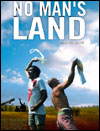 No
Man’s Land, directed and written by Danis Tanovich,
tries to dramatize the absurdity of the current UN-enforced
peace in Bosnia. Chiki (played by Branko Djurich) is a Bosnian,
and Nino (played by Rene Bitorajac) is a Serb during the Bosnia
War in 1993. When the fog lifts one morning, a few Serbs successfully
attack a small group of Bosnians. Chiki retreats to a trench
between enemy lies to avoid getting shot. When two Serbs are
dispatched to verify that all the Bosnians have been killed,
they locate the trench and place one of the Bosnian soldiers,
presumably dead, on top of a spring-loaded bomb that will
explode beneath him if the body were to move. As they do so,
Chiki steals one of their rifles and shoots the two Serbs;
one Serb dies, while the other, Nino, is wounded. Then Chera
(played by Filip Shovagovich) regains consciousness, only
to find that he is on top of a mine that would explode to
kill all three if he moved. A violent solution to the dilemma
will not save the three; only a peaceful solution can work.
Accordingly, Chiki and Nino radio the UN peacekeeping force
for help. Soon they are visited by a UN sergeant, a journalist,
and ultimately the UN commander, none of whom takes responsibility
for Chera's fate. The film is a paradigm of the Bosnian War,
showing the absurdity of the war itself, which has produced
more problems through violence. In the context of the film,
however, the obvious humanitarian solution is not taken because
each person plays a Kafkaesque role within a larger bureaucratic
organization. At times the dialog is comical because the situation
is absurd, but ultimately the two soldiers take advantage
of the presence of UN transportation to get out of the trench,
leaving the man on top of the bomb to die. Although the director
sought to make an anti-war film, No Man’s Land
is actually an anti-UN film, showing that politics trumps
humanitarianism within the UN bureaucracy. MH
No
Man’s Land, directed and written by Danis Tanovich,
tries to dramatize the absurdity of the current UN-enforced
peace in Bosnia. Chiki (played by Branko Djurich) is a Bosnian,
and Nino (played by Rene Bitorajac) is a Serb during the Bosnia
War in 1993. When the fog lifts one morning, a few Serbs successfully
attack a small group of Bosnians. Chiki retreats to a trench
between enemy lies to avoid getting shot. When two Serbs are
dispatched to verify that all the Bosnians have been killed,
they locate the trench and place one of the Bosnian soldiers,
presumably dead, on top of a spring-loaded bomb that will
explode beneath him if the body were to move. As they do so,
Chiki steals one of their rifles and shoots the two Serbs;
one Serb dies, while the other, Nino, is wounded. Then Chera
(played by Filip Shovagovich) regains consciousness, only
to find that he is on top of a mine that would explode to
kill all three if he moved. A violent solution to the dilemma
will not save the three; only a peaceful solution can work.
Accordingly, Chiki and Nino radio the UN peacekeeping force
for help. Soon they are visited by a UN sergeant, a journalist,
and ultimately the UN commander, none of whom takes responsibility
for Chera's fate. The film is a paradigm of the Bosnian War,
showing the absurdity of the war itself, which has produced
more problems through violence. In the context of the film,
however, the obvious humanitarian solution is not taken because
each person plays a Kafkaesque role within a larger bureaucratic
organization. At times the dialog is comical because the situation
is absurd, but ultimately the two soldiers take advantage
of the presence of UN transportation to get out of the trench,
leaving the man on top of the bomb to die. Although the director
sought to make an anti-war film, No Man’s Land
is actually an anti-UN film, showing that politics trumps
humanitarianism within the UN bureaucracy. MH
I
want to comment on this film